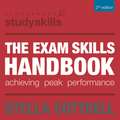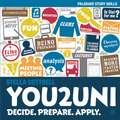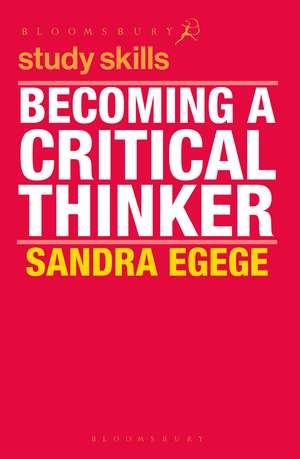Becoming a Critical Thinker: Bloomsbury Study Skills
Autor Sandra Egegeen Limba Engleză Paperback – 26 noi 2020
Din seria Bloomsbury Study Skills
- 8%
 Preț: 113.15 lei
Preț: 113.15 lei - 5%
 Preț: 113.19 lei
Preț: 113.19 lei -
 Preț: 147.12 lei
Preț: 147.12 lei - 8%
 Preț: 131.83 lei
Preț: 131.83 lei - 13%
 Preț: 121.58 lei
Preț: 121.58 lei - 8%
 Preț: 197.14 lei
Preț: 197.14 lei - 6%
 Preț: 138.03 lei
Preț: 138.03 lei - 7%
 Preț: 109.89 lei
Preț: 109.89 lei - 7%
 Preț: 157.16 lei
Preț: 157.16 lei - 14%
 Preț: 198.74 lei
Preț: 198.74 lei - 13%
 Preț: 127.84 lei
Preț: 127.84 lei - 13%
 Preț: 154.50 lei
Preț: 154.50 lei - 21%
 Preț: 125.30 lei
Preț: 125.30 lei - 12%
 Preț: 123.45 lei
Preț: 123.45 lei -
 Preț: 146.94 lei
Preț: 146.94 lei - 6%
 Preț: 132.56 lei
Preț: 132.56 lei -
 Preț: 114.22 lei
Preț: 114.22 lei - 8%
 Preț: 114.04 lei
Preț: 114.04 lei - 7%
 Preț: 135.20 lei
Preț: 135.20 lei - 6%
 Preț: 118.92 lei
Preț: 118.92 lei - 18%
 Preț: 120.41 lei
Preț: 120.41 lei - 19%
 Preț: 125.00 lei
Preț: 125.00 lei - 13%
 Preț: 189.38 lei
Preț: 189.38 lei - 14%
 Preț: 112.72 lei
Preț: 112.72 lei - 13%
 Preț: 106.77 lei
Preț: 106.77 lei - 14%
 Preț: 154.42 lei
Preț: 154.42 lei - 14%
 Preț: 165.91 lei
Preț: 165.91 lei - 7%
 Preț: 149.90 lei
Preț: 149.90 lei - 5%
 Preț: 120.71 lei
Preț: 120.71 lei -
 Preț: 166.58 lei
Preț: 166.58 lei - 18%
 Preț: 133.61 lei
Preț: 133.61 lei - 6%
 Preț: 123.97 lei
Preț: 123.97 lei -
 Preț: 131.73 lei
Preț: 131.73 lei -
 Preț: 234.89 lei
Preț: 234.89 lei - 7%
 Preț: 114.92 lei
Preț: 114.92 lei - 6%
 Preț: 123.97 lei
Preț: 123.97 lei - 13%
 Preț: 115.38 lei
Preț: 115.38 lei - 13%
 Preț: 115.84 lei
Preț: 115.84 lei - 8%
 Preț: 112.27 lei
Preț: 112.27 lei - 14%
 Preț: 120.87 lei
Preț: 120.87 lei - 7%
 Preț: 157.62 lei
Preț: 157.62 lei - 7%
 Preț: 129.00 lei
Preț: 129.00 lei - 7%
 Preț: 162.20 lei
Preț: 162.20 lei - 14%
 Preț: 184.21 lei
Preț: 184.21 lei -
 Preț: 108.78 lei
Preț: 108.78 lei -
 Preț: 154.33 lei
Preț: 154.33 lei -
 Preț: 167.87 lei
Preț: 167.87 lei - 13%
 Preț: 106.61 lei
Preț: 106.61 lei
Preț: 126.61 lei
Preț vechi: 164.03 lei
-23% Nou
Puncte Express: 190
Preț estimativ în valută:
24.23€ • 25.03$ • 20.17£
24.23€ • 25.03$ • 20.17£
Carte tipărită la comandă
Livrare economică 25 martie-08 aprilie
Livrare express 15-21 februarie pentru 58.41 lei
Preluare comenzi: 021 569.72.76
Specificații
ISBN-13: 9781352011333
ISBN-10: 1352011336
Pagini: 187
Dimensiuni: 155 x 235 x 15 mm
Greutate: 0.29 kg
Ediția:1st ed. 2021
Editura: Bloomsbury Publishing
Colecția Bloomsbury Academic
Seria Bloomsbury Study Skills
Locul publicării:London, United Kingdom
ISBN-10: 1352011336
Pagini: 187
Dimensiuni: 155 x 235 x 15 mm
Greutate: 0.29 kg
Ediția:1st ed. 2021
Editura: Bloomsbury Publishing
Colecția Bloomsbury Academic
Seria Bloomsbury Study Skills
Locul publicării:London, United Kingdom
Caracteristici
Situates critical thinking ?within an epistemological framework, enabling students to understand the relevance and importance of critical thinking in academic study and everyday life
Notă biografică
Sandra Egege is an Affiliate Lecturer at Flinders University, Australia.
Cuprins
Foreword Glossary 1. Why critical thinking matters: research, knowledge and epistemology 2. Overcoming barriers: cognitive biases 3. Overcoming barriers: problems with perception 4. Knowledge claims: recognising and writing an argument 5. Critiquing the logic of the argument: logical thinking and common fallacies 6. Critical thinking and digital literacy: evaluating the information source 7. Critiquing the literature: How do you know that is so? 8. Critiquing the evidence: quantitative and qualitative research methodologies 9. Writing an argument: making it persuasive 10. Writing (critical) literature reviews 11. Critical thinking as critical self-reflection 12. Critical thinking in the workplace References Index.
Recenzii
Using everyday examples and exercises, this book takes students on a journey of critical self-reflection. It is a valuable resource to anyone seeking to develop their critical thinking skills.
Egege's book focuses on practical outcomes for real, diverse, students, and is packed with interesting examples and practical skills. It will improve your thinking for university, the workforce, and beyond.
Egege's book focuses on practical outcomes for real, diverse, students, and is packed with interesting examples and practical skills. It will improve your thinking for university, the workforce, and beyond.
